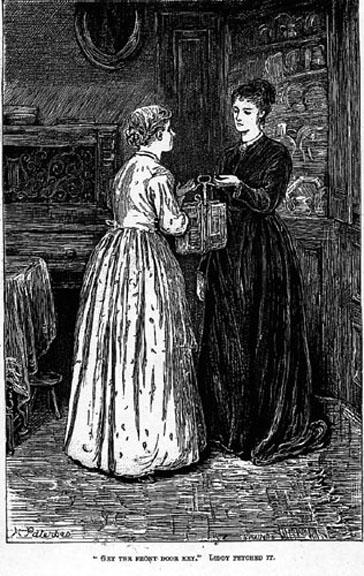4.4 Dialogue
The conversation between the two women and the way they talk to each other says a great deal about their characters and their relationship: they may be mistress and servant, but they are easy and comfortable in each other’s company. Liddy is clearly superstitious, and her superstitions extend to what ought, and ought not, to take place on a Sunday. Bathsheba thinks that is nonsense, and is also dismissive about Sunday observance ‘what’s right week days is right Sundays’.

Liddy very properly addresses Bathsheba as ‘Miss’ indicating her subservient position, but the question she asks simply suggests one young woman gossiping and chatting to another: ‘Did you ever find out, Miss, who you are going to marry by means of the Bible and key?’ The question doesn’t come across as impertinent, nor does Bathsheba take it in that way: ‘Don’t be so foolish Liddy. As if such things could be.’ Her education as well as her social status is superior to Liddy’s and she is not given to such superstitious nonsense, but Liddy is not afraid to stand up for her own beliefs: ‘it makes your heart fearful!’ she says, and while some people believe in it, and others don’t, ‘I do’ she declares. Rather than dismissing the idea, she sends Liddy to find the front door key so they can try out the superstition for themselves. Rather than simply ridiculing the ‘foolish’ practice, Bathsheba appears to take it seriously. Notice that she blushes as the Bible turns, which suggests that, whatever the intentions, she has entered into the spirit of the fortune-telling. She is full of contradictions like this which make her character more complex and – you may decide – more interesting and convincing.
Her blushes prompt Liddy to ask ‘Who did you try?’ and when Bathsheba refuses to tell her, Liddy, that ever-rippling shallow little brook, picks up on an unspoken association of ideas and teasingly plays with it. She asks first if her mistress noticed what Boldwood did in church that morning. Which turns out to be nothing at all: unlike the rest of the congregation, he failed to even glance at Bathsheba. ‘Rich and gentlemanly, what does he care?’ Liddy remarks. And then Bathsheba’s unspoken thought processes turn to the ‘gorgeously illuminated and embossed’ valentine she bought in Casterbridge the day before to give to a little boy called Teddy Coggan as a ‘pretty surprise’ for him. But the card is destined for a different recipient.
